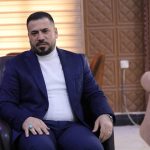
Al-Mousawi calls on the government to take a decisive stance on the US troop withdrawal agreement.
Jun 21, 2025

The General Secretary of the Asa’ib Ahl al-Haq, His Eminence Sheikh Qais al-Khazali, affirmed that the political process in Iraq after 2003 was based on the principle of components, noting that the Kurdish component is a fundamental part of this process.
During a televised interview, His Eminence explained that his personal conviction is that the Kurdish leadership, since the beginning of the new phase after 2003, has viewed its ideal project as realizing the Kurdish dream of secession, a goal it effectively sought through the 2017 independence referendum, which had numerous negative repercussions.
His Eminence pointed out that “Kurdish uniqueness” is something he recognizes and appreciates, emphasizing that the Kurds “have their own geography, environment, language, customs, and traditions.” However, this does not prevent him from constantly calling for “political realism” and positive engagement with the Iraqi state.
His Eminence added that “what happened after the 2017 referendum was supposed to be enough to motivate the leadership of the Kurdistan Region to send positive messages and begin a new approach,” but that this has not yet happened. He pointed out that the Iraqi state has nevertheless taken what he described as “good” steps, including allocating huge sums of money for the salaries of the region’s employees, amounting to nine or ten trillion dinars per month, despite the existence of legal and constitutional reservations about this measure.
Sheikh Khazali criticized the “lack of transparency in the mechanisms for disbursing these funds,” explaining that “the payment of these sums must be accompanied by the provision of the necessary data, the identification of names, the settlement of financial files, and the recognition of the quantities of smuggled oil,” which, according to his statements, has not yet been achieved.
His Eminence pointed out that “the law was conditional on the region handing over its oil revenues, taxes, and other fees, in addition to what enters through the border crossings,” explaining that “the Iraqi state nevertheless sent this money in a clear message of its positive intentions and respect for the people of Kurdistan.” He emphasized that he holds no grudge against the Kurdish people and made this statement from within the Sulaymaniyah Governorate.
In the same context, Sheikh Khazali stressed his full support for granting Kurdish employees their rights and salaries, but demanded that this be “coupled with the regional government’s commitment to its duties and the cessation of policies that push Iraqi Kurdistan away from Iraq”.
His Eminence also commented on the visit of Kurdistan Regional Government Prime Minister Masrour Barzani to the United States, stating that “what happened during it indicates that there has been no change in approach, and that the same policy continues, something that is harmful to Kurdistan and its people before it harms Iraq as a whole”.
Sheikh Al-Khazaali believed that the Iraqi state could not continue to deliver “good messages” indefinitely, stressing that “the state has binding decisions from the Federal Court, and these must be respected”.
His Eminence called on the region’s leaders to reconsider their positions, saying, “By God, we love you, our people, and you are welcome as partners in Iraqi decision-making. I believe that what happened should be sufficient to prove that your interests lie in Iraq”.
Sheikh Khazali revealed that he had met with Kurdistan Regional Government President Nechirvan Barzani to discuss the issue of oil smuggling, noting that “the trucks seized in Afghanistan and Pakistan are evidence of this.” He added, “It’s no secret. Everyone knows: the Kurdistan Regional Government, the Iraqi government, Saudi Arabia, the United States, and even OPEC have evidence”.
His Eminence explained that “OPEC reduced Iraq’s production quota by 400,000 barrels per day because it knows that the same amount of Iraqi oil is being smuggled daily,” warning that “the bulk of this oil comes from Kirkuk and the Nineveh Plain, causing annual losses that could exceed $2 billion from Iraq’s budget”.
His Eminence criticized the region’s continued refusal to export oil through SOMO, despite the concessions and flexibility shown by the Iraqi government, noting that “arguments are still being used to prevent this connection”.
Sheikh Khazali also reiterated his assertion that “the continuation of the Kurdish dream of secession is not merely an internal issue, but is also related to regional developments, particularly in Syria,” noting that what is happening today “is closely linked to that project”.

Jun 21, 2025

Jun 21, 2025
